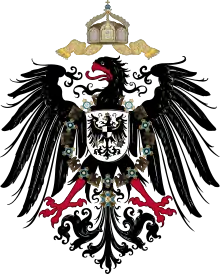Paul Behncke
Paul Behncke (13 August 1869 – 4 January 1937) was a German admiral during the First World War, most notable for his command of the III Battle Squadron of the German High Seas Fleet during the Battle of Jutland.
Paul Behncke | |
|---|---|
_(cropped).jpg.webp) | |
| Born | 13 August 1869 Lübeck |
| Died | 4 January 1937 (aged 67) Berlin |
| Allegiance | |
| Service/ | |
| Years of service | 1883–1924 |
| Rank | Admiral |
| Commands held | III Battle Squadron |
| Battles/wars | World War I |
| Awards | Pour le Mérite |
Naval career
He was born in Lübeck in 1869. At the age of fourteen he joined the navy and as an officer commanded a gunboat in the Far East. After studying at the Naval Academy in Kiel he was assigned to the general staff. As commander of the unprotected cruiser SMS Falke, he returned to Chinese waters and on being promoted to the rank of captain he was appointed to the battleship SMS Wettin, and afterwards to the dreadnought SMS Westfalen.
Shortly before the outbreak of the First World War Behncke was promoted to Konteradmiral (Rear Admiral) and again assigned to the general staff. During the conflict he was opposed to Admiral Alfred von Tirpitz's theories on submarine warfare, and was appointed head of the III Battle Squadron, composed of the eight most modern battleships of the German navy (the König and Kaiser classes). Leading these ships aboard his flagship SMS König, Behncke took part in the Battle of Jutland, where he was seriously wounded by a shell splinter and found himself in command of the whole fleet during the third phase of the action.
During the 1917 Battle of Moon Sound he prevented the retreat of part of the Russian fleet and sank the Slava. By that time he had the rank of Vizeadmiral (Vice Admiral) and the following year, after the renunciation of Admiral Eduard von Capelle, rose to Secretary of State of the Imperial Naval Office, a position he held for only one month before being relieved.
Behncke regained office after the war, replacing admiral Adolf von Trotha, and retired from the navy in 1924. In retirement, Behncke served as the president of the German-Japanese Society.[1] He died in Berlin in 1937.
References
- "ADMIRAL BEHNCKE, 70, OF GERMANY IS DEAD". New York Times. 5 January 1937.
- Enciclopedia General del Mar, Jose Mª Martinez - Hidalgo, Volume I, s.v. BEHNCKE, Paul, Page 1323, Ediciones Garriga, S.A., Barcelona, 1968
External links
| Military offices | ||
|---|---|---|
| New creation | Chef der Marineleitung 15 September 1920 – 25 September 1924 |
Succeeded by Vizeadmiral Hans Zenker |
| Preceded by Konteradmiral William Michaelis |
Chef der Admiralität 1 – 14 September 1920 |
Office renamed |
| Preceded by Admiral Eduard von Capelle |
Staatssekretär im Reichsmarineamt 18 – 27 September 1918 (Acting since August 28th) |
Succeeded by Vizeadmiral Ernst Karl August Klemens von Mann |
| Preceded by Admiral Reinhard Scheer |
Chef des III. Geschwaders 24 January – 11 August 1918 |
Succeeded by Vizeadmiral Hugo Kraft |
| New creation | Deputy Chief of the Admiralty Staff 2 August 1914 – 4 September 1915 |
Succeeded by Vizeadmiral Reinhard Koch |
| Preceded by Kapitän zur See Friedrich Gädeke |
Commanding officer of SMS Westfalen 15 September 1910 – 30 September 1911 |
Succeeded by Kapitän zur See Wilhelm Starke |
| Preceded by Kapitän zur See Wilhelm Souchon |
Commanding officer of SMS Wettin 19 September 1909 – 14 September 1910 |
Succeeded by Kapitän zur See Hermann Nordmann |
| Preceded by Korvettenkapitän Friedrich Musculus |
Commanding officer of SMS Falke 30 October 1903 – 3 November 1905 |
Succeeded by Korvettenkapitän Georg von Ammon |
